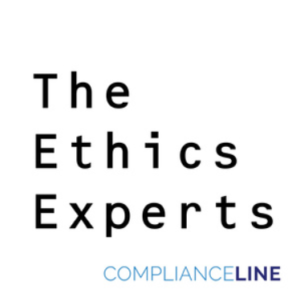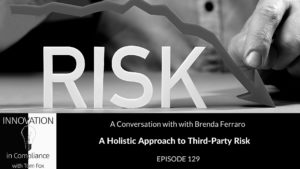Normally I’m on the side of the table asking questions and interviewing guest, but in this very special #internalauditpodcast episode of #jammingwithjason you get to experience Silvia Puhani interviewing me.
Silvia recently interviewed me for her podcast: Interne Revision, and graciously gave me access to the recording so I could also share it with you.
We discussed:
– my career
– the differences between internal and external auditing
– how you can improve your internal audit marketing
– how to communicate effectively, and
– my views on the future of internal audit
For those of you that speak German, make sure to check out Silvia’s podcast: https://www.puhani.com/index.php/podcast-2/
Day: May 19, 2020
The Compliance Life details the journey to and in the role of a Chief Compliance Officer. How does one come to sit in the CCO chair? What are some of the skills a CCO needs to success navigate the compliance waters in any company? What are some of the top challenges CCOs have faced and how did they meet them? These questions and many others will be explored in this new podcast series. This month, I visit with Ellen Hunt, Senior Vice President – Audit, Ethics & Compliance Officer.
Ellen is a lawyer, ethics & compliance professional, and chief audit executive. She has extensive management experience in designing, implementing and operating ethics and compliance programs including board governance and reporting, designing ethics education, creating policy management frameworks, managing enterprise and compliance risk processes as well as handling investigations and regulatory inquiries. Utilizing AARP’s enterprise risk management profile, she re-designed how AARP conducts its annual audit planning process to identify audits that relate to the organization’s must significant risks and incorporated the use of data analytics into audit execution.
In this episode, Ellen relates what happens when you get into the CCO chair. She emphasized it is a great opportunity. You must determine your highest risks and move to manage those risks. You need to get to know your team, assess their strengths and weakness and conclude how to use those skills. Learn the budgeting process and push for a realistic budget. Finally, get to know your Board and your Compliance Committee or Audit Committee chair.

On this special bonus episode of The Ethics Experts, we speak with Matt Kelly about compliance as a function of the risk community, and how COVID-19 is speeding up the timeline of regulatory compliance.
Check out more episodes, and don’t forget to subscribe on your favorite podcast platform!
Opinion Releases can provide valuable information for the compliance practitioner. I agree with the statement found in the 2012 FCPA Guidance that “DOJ’s opinion procedure is a valuable mechanism for companies and individuals to determine whether proposed conduct would be prosecuted by DOJ under the FCPA. Generally speaking, under the opinion procedure process, parties submit information to DOJ, after which DOJ issues an opinion about whether the proposed conduct falls within its enforcement policy.” In the areas of charitable donations, the DOJ has provided four Opinion Releases which give solid guidance on this tricky issue under the FCPA. In each Opinion Release, the DOJ indicated that it would not initiate prosecutions based upon the fact scenarios presented to it.
Three key takeaways:
- You can utilize the Opinion Release process for a wide variety of issue.
- You must manage your charitable donations program even after the money has been donated.
- Never forget the Mendelsohn common sense approach to charitable donations.
In this five-part podcast series, sponsored by K2 Intelligence FIN, we consider defining and building effective compliance programs. I am joined in this series by Michelle Goodsir, a Managing Director at K2 Intelligence FIN. Gail has 25 years of financial crime compliance experience which includes fraud risk management, anti-bribery and corruption, corporate security and investigations, sanctions, and Anti-Money Laundering (AML) program experience working within the financial services industry and the U.S. government. Gail Fuller is a Vice President at K2 Intelligence FIN. Gail focuses on developing, refining, and implementing FIN’s quantitative and qualitative risk rating tools. She leads engagements focused on helping FIN’s jurisdictional and private sector clients understand their exposure to financial crime risk and develop and implement strategies to mitigate their risks. Over this series we will consider key challenges in compliance, why compliance needs a seat at the table, how to do compliance on a budget, training and culture and what is on the horizon. In this Part 2, I visit with Michelle Goodsir on compliance needs to be an integral part of your business strategy going forward. Some of the highlights include:
Resources
K2 Intelligence financial crimes risk & compliance page: https://www.k2intelligence.com/en/services/our-practices/financial-crimes-risk-and-compliance
K2 Intelligence AML page: https://www.k2intelligence.com/en/services/our-practices/financial-crimes-risk-and-compliance/anti-money-laundering-compliance
K2 Intelligence Anti-corruption page: https://www.k2intelligence.com/en/services/our-practices/financial-crimes-risk-and-compliance/anti-corruption
K2 Intelligence DOLFIN: https://www.finintegrity.com/dolfin.html
Welcome to the newest addition to the Compliance Podcast Network, Compliance and Coronavirus. As the Voice of Compliance, I wanted to start a podcast which will help to bring both clarity and sanity to the compliance practitioner and compliance profession during this worldwide health and healthcare crisis. In this episode, I am joined by John Shegerian, President of ERI. We visit on the new normal of working from home, its implications for data security, mental health issues for workers during Covid-19 and how data is the new oil.

Tom Fox welcomes VP of Third-Party Risk at Prevalent, Brenda Ferraro, to this week’s Innovation In Compliance show. They discuss Prevalent’s 2020 Third-Party Risk Management study, its key findings, and implications for compliance professionals.
A Holistic Approach
Brenda describes Prevalent’s mission as “…delivering a unified third-party risk management platform that’s going to enable businesses to better reveal and interpret and alleviate risk by simplification and speeding risk mitigation awareness …” Prevalent does this through “economic approaches with standardization, how to use networks, how to leverage completed content gathering and making sure that we’re doing the big bang for the buck,” Brenda says. She emphasizes the importance of a holistic and economic approach.
Key Findings and Recommendations
Tom and Brenda discuss why Prevalent commissioned The 2020 Third-Party Risk Management study and its key findings and recommendations. Brenda says that the objective of the study was to provide “a state of the union” on third party risk as well as actionable recommendations to the industry. She lists some of the key findings, including:
- a lack of process which lessens third party program effectiveness;
- third party risk management is a team sport;
- many companies lack confidence in their risk management programs and the results they’re getting;
That companies need a comprehensive risk management process is the study’s predominant recommendation. Brenda critiques the compliance industry’s affinity for questionnaires, which just expose vulnerabilities but do nothing to mitigate them. She remarks, “…if you don’t have a way to track and monitor your performance indicators and your risk indicators, then what you’re doing is, you’re spending a lot of time with questionnaire fatigue, gathering content administratively, identifying risks, and then it stops there. So we’ve got to get to the point where we’re looking at inherent risk and residual risks qualitatively and quantitatively so that we can end up doing what’s best for the company moving forward.” She argues that industries need to work together to identify and address vulnerabilities across sectors. Working together and sharing information will help everyone elevate their risk posture and reduce vulnerabilities.
Resources
Prevalent.net
2020 Third-Party Risk Management Study Report


